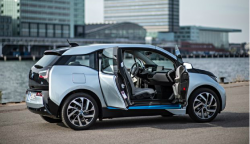
— A BMW i3 "range extender" (REx) class-action lawsuit alleges the cars suddenly lose both power and speed when the range extender option is activated.
The BMW lawsuit focuses on 2014-2016 i3 REx cars advertised as including a "fuel extender" gasoline engine with a small gas tank that sends gas to the engine when the battery level drops.
BMW announced the i3 electric car to the world in 2013 as "an electric vehicle that performs like a BMW...because it is one.”
According to the i3 lawsuit, BMW advertises the fuel extender as a generator to produce electricity and extend the range of the car from 81 miles per charge to 150 miles per charge. But the plaintiff says the problem arises from BMW allegedly failing to tell consumers that when the fuel extender is activated, the i3 REx cannot maintain the speed and performance of normal operation.
The proposed class-action lawsuit was filed after plaintiff Edo Tsoar leased a 2015 BMW i3 REx in January 2016. Tsoar says a big reason he leased the car was because of the range extender feature, but the plaintiff now says his decision was a mistake.
The i3 REx lawsuit alleges while the range extender is active and the car is full of passengers or going up a hill, the speed will dramatically decrease as the battery charge goes down. Mr. Tsoar says BMW knew about this problem but failed to tell consumers so the automaker could keep selling the cars.
The plaintiff says the problem with the range extender is the sudden and severe loss of power that occurs without warning, creating a danger on the roads.
Mr. Tsoar says the problem happened to him when the battery was around 6 percent and the car was traveling up a hill in a line of traffic. The plaintiff claims the car suddenly lost power and decreased speed, causing Mr. Tsoar to quickly change lanes because the i3 was moving slowly. After this occurring on numerous occasions, the plaintiff says he noticed the battery was always near 5 percent and the range extender feature was activated.
Tsoar says he tried to return the i3 to the dealership and was told he should change his driving habits to avoid the problem. The plaintiff says he now avoids driving more than 80 miles per charge because of the alleged defect.
A California 2014 BMW i3 owner echoes the allegations laid out in the range extender lawsuit and adds another problem experienced with the car.
"driving at highway speed of 65 mph, with battery power drained, the rex (reserve engine) turns on. Suddenly, speed drops from 65 mph to 40 mph while on a 2-lane ca freeway, almost causing me to be rear-ended by traffic. One month later, same situation, same problem."
The i3 owner went on to complain about a separate issue with the total capable miles even when using the REx option.
"manufacturer states a combined mileage range of 80 miles on battery, 60 miles on rex (reserve engine), for a combined range of 140 miles. I have never had more than 60 miles on battery and 40 miles on rex for a combined mileage of 100 miles, 40% less than BMW states, even though I use a professionally installed level 2 charger."
The BMW i3 REx lawsuit alleges owners paid premium prices for their cars believing the range extender option was worth the extra money.
The BMW i3 range extender (REx) lawsuit was filed in the U.S. District Court for the Central District of California - Edo Tsoar, et al v. BMW of North America, LLC.
The plaintiff is represented by MLG Automotive Law.




